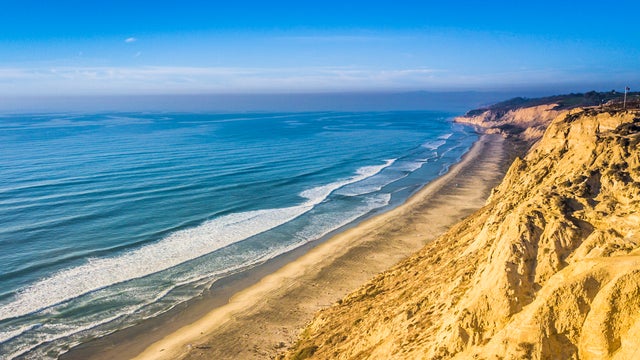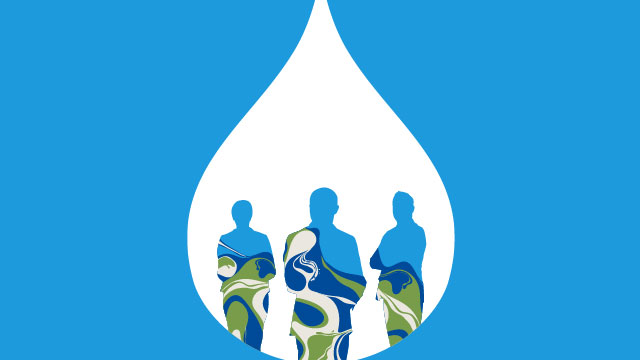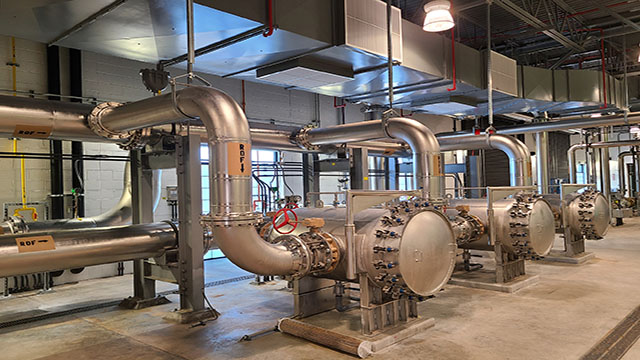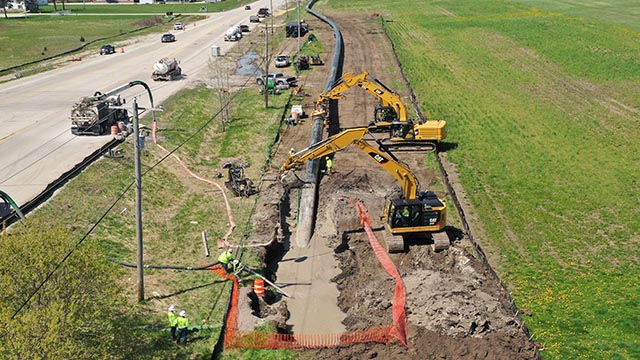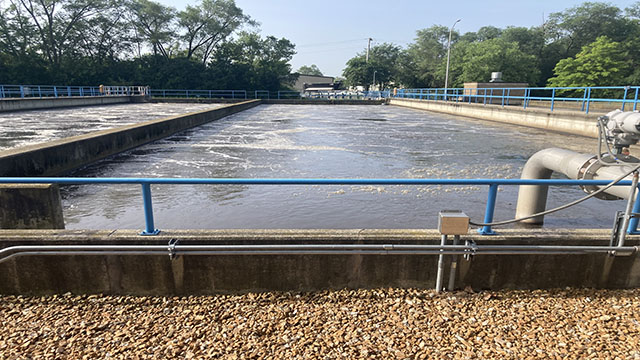The Groundwater Replenishment System (GWRS) in southern California is the world’s largest wastewater purification facility for indirect potable reuse (IPR). The system produces high-quality recycled water used to recharge the Orange County Groundwater Basin – the primary potable water supply for more than 2.5 million people.
A final expansion of the GWRS was dedicated in 2023 and culminated nearly 50 years of collaboration between the Orange County Water District (OCWD) and Orange County Sanitation District (OC San), aided from the beginning by Black & Veatch, to bring water sustainability and resilience to their customers.
With Black & Veatch leading the design, the final expansion project added 30 million gallons a day (mgd) to the system’s capacity, upping its total to 130 mgd, enough for 1 million people. It also enabled for the first time 100% of OC San’s reclaimable wastewater flows to be recycled.
While getting to 130 mgd and 100% recycling capacity, the project upgraded the GWRS and optimized its performance.
Generating Efficiencies and Savings
To increase the system’s capacity – to keep pace with Orange County’s water demands, protect its groundwater basin and maintain its water independence – the project tapped OC San’s remaining reclaimable wastewater not already being supplied to the system. The source: OC San’s Treatment Plant No. 2, located more than 3 miles from the GWRS.
Using the new source meant new conveyance facilities and upgrades to OC San’s facilities were necessary. The work included a new secondary effluent pump station and two secondary effluent flow equalization tanks, plus modifications to Plant No. 2’s headworks, to separate reclaimable from non-reclaimable flow.
Also required were improvements to the GWRS’ Advanced Water Treatment Facility (AWTF). The AWTF purifies the treated wastewater from OC San using microfiltration (MF), reverse osmosis (RO) and ultraviolet light (UV) plus hydrogen peroxide. Modifications to the process were needed to account for the higher total dissolved solids and increased ammonia and alkalinity in the influent coming from Treatment Plant No. 2, compared to what the AWTF had been treating prior to the final expansion.
Implementing the new facilities and modifications, Black & Veatch created efficiencies and savings through solutions including:
Integrated interstage boosting to address flux imbalances in the RO array
Retrofitted all 21 of the system’s 5 mgd RO units
Maintained the RO system’s 85% recovery rate
The boosters control fouling, extend time between membrane cleanings, and improve overall system performance
Expected to save more than $10 million over the life of the equipment
Pilot tested polyvinylidene fluoride (PVDF) hollow-fiber membranes
Prepared three 30% designs of microfiltration (MF) expansion, each with a different PVDF product and full life-cycle analysis
Supported procurement of the best-fit design to handle high-fouling influent potential
The use of more chemically tolerant PVDF MF membranes reduces frequency of backwashes and extends membrane life, resulting in operational cost savings
Resulted in a $8 million credit change order during construction
Included dedicated feed pipelines, flow control features, system control logic
Optimizing the flowrate from three sources of effluent maximized production and minimized operational costs
Repurposed a 66-inch diameter pipeline originally built in 1957 to bring effluent from Plant No. 2 to the GWRS
Slip-lined the pipeline and optimized its design to ensure the structural integrity of the force main system yet minimize the wall thickness, realizing an annual energy saving of approximately $200,000
The solution reduced environmental impacts during construction, mitigated construction time and local impacts, and created energy savings by using a larger-diameter force main
Relocated to maximize gravity flow and minimize the amount of flow needing to be pumped
Overcame hydraulic and site constraint challenges by integrating diversion structures and control weir structures for flow management under numerous operating scenarios
$10 million in grants
Low-interest-rate loan from the EPA’s Water Infrastructure Finance & Innovation Act
Loan from the State Revolving Fund program
Water from the GWRS makes up a large part of OCWD’s water supply portfolio – approximately 35% of its total water demands. The system has produced more than 400 billion gallons of near-distilled quality water since it first became operational in 2008. Its success has grown public trust in the potential and benefits of advanced water purification technologies, inspiring water reuse projects around the world.
The Final Expansion project fortified the system’s reliability and resilience plus the affordability of OCWD’s water supply by further reducing its need to import water from the State Water Project and the Colorado River. It supports better water quality in the Orange County Groundwater Basin, strengthening the basin’s protection from seawater intrusion, and it has further reduced OC San’s discharge of treated wastewater into the Pacific Ocean, improving its water quality.
GWRS Timeline
1975
Water Factory 21, a water reclamation and desalting facility and a precursor to the GWRS, begins producing 15 mgd
2004
Groundbreaking for the GWRS – world’s largest water purification facility
2008
GWRS comes online, produces 70 mgd
2015
Initial expansion of the GWRS is completed, increasing its capacity to 100 mgd
2018
GWRS produces 100,008,000 gallons in 24 hours, setting a Guinness Book World Record for most wastewater recycled into drinking water in a day
2022
Receives water from OC San Plant No. 2, able to recycle 100% of OC San’s reclaimable wastewater flows
2023
Final expansion completed; increases the GWRS’ capacity to 130 mgd, enough to serve 1 million people
Black & Veatch has worked on the GWRS throughout much of its history, providing planning, design and construction services to OCWD and OC San.

